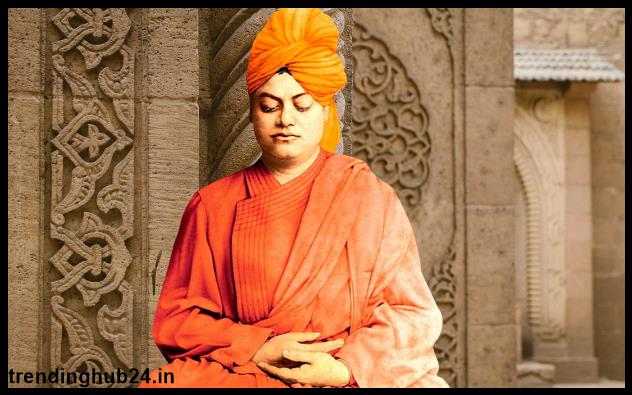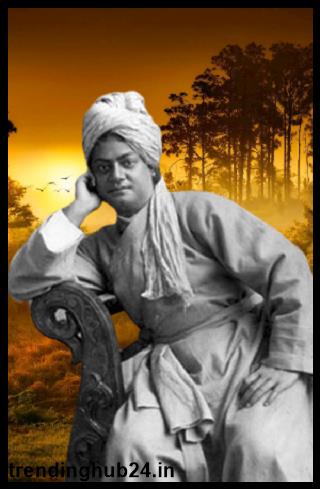🚀 Become a Verified Author on Trending Hub24
✍️ Author Account Available @ $60 / Month | +91 7355993756
Facts About Swami Vivekananda The Man Of The Era

Friends, if you also want to know about Swami Vivekananda, the man of the era, then you have come to the right page.
Table of Contents
#Swami Vivekananda The Man Of The Era:
Friends, if you also want to know about #Swami Vivekananda, the man of the era, then you have come to the right page.

Swami Vivekananda was born on January 12, 1863, in Kolkata, India and his birth name was Narendra Nath Dutt. He was greatly influenced by his Guru Sri Ramakrishna Paramhansa and became his devoted disciple. He was a disciple and spiritual successor of the Indian mystic Sri Ramakrishna Paramahamsa, who played a significant role in shaping his spiritual journey.
#1: #Swami Vivekananda was a key figure in the introduction of Vedanta and Yoga to the Western world, and played an important role in popularizing Hindu philosophy and spirituality globally.
#2: In 1893, Swami Vivekananda delivered a historic speech at the Parliament of the World's Religions in Chicago, where he introduced Hinduism and talked about religious tolerance and universal acceptance.
#3: He founded the Ramakrishna Math and the Ramakrishna Mission in 1897, which continue to serve as important educational institutions, hospitals, and religious, spiritual, and charitable organizations around the world.
#4: #Swami Vivekananda emphasized the importance of education and its role in social change. He believed in imparting practical knowledge and spiritual values for the upliftment of the society. He traveled extensively within India spreading the message of spiritual enlightenment, social reform, and unity of religions. He composed various poems and songs, which reflect his devotion to God and his spiritual experiences.
#5: He emphasized the importance of education and considered it an important tool for personal and social transformation. #Swami Vivekananda's teachings emphasized the unity of all religions and the existence of a universal truth underlying them.

You read this post: trendinghub24.in
#6: #Swami Vivekananda's teachings cover a wide range of topics, including self-realization, self-discipline, meditation, service to humanity, and the pursuit of knowledge. Swami Vivekananda's teachings emphasized a balance between the spiritual and material aspects of life.
#7: He was deeply concerned about the plight of the poor, oppressed, and marginalized sections of society. Swami Vivekananda advocated for their welfare and worked towards eradicating social evils like caste discrimination. #Swami Vivekananda believed in the concept of "Daridra Narayan", which means serving the poor and considering them as incarnations of the divine.
#8: He advocated the empowerment of women and believed in their inherent strength and capabilities. He had a profound influence on many famous personalities including Mahatma Gandhi and Rabindranath Tagore.
#9: #Swami Vivekananda promoted the idea of self-realization and encouraged individuals to discover their inner potential.
#10: He strongly condemned social evils like caste discrimination and worked towards eradicating them.
#Swami Vivekananda passed away on July 4, 1902, at the young age of 39, leaving behind an enduring legacy and inspiring countless individuals with his teachings. He believed in the power of meditation and its ability to calm the mind and realize one's true self. Honoring his teachings and vision, his birthday, 12 January, is celebrated as National Youth Day in India.
Swami Vivekananda's lectures and writings inspire and continue to inspire millions of people around the world even today.
also read this: Full Information Of Virat Kohli
also read this: Full Information Of MS Dhoni
also read this: Full Information About PM Narendra Modi
also read this: Gitanjali Aiyar Newsreader Wiki Pedia Biography History
FAQ's About #Swami Vivekananda's:
Question: What is the importance of #Swami Vivekananda's teachings today?
Ans: #Swami Vivekananda's teachings continue to resonate with people around the world. His emphasis on spiritual harmony, universal acceptance, and the practical application of knowledge remains relevant in addressing the challenges of the modern world. His teachings inspire individuals to seek inner transformation and work toward the betterment of society.
Q: Did #Swami Vivekananda write any books?
Ans: Yes, Swami Vivekananda authored several books and lectures. His most famous works include "Raja Yoga," "Karma Yoga," "Jnana Yoga," "Bhakti Yoga," and "Lectures from Colombo to Almora." These books expound on various aspects of spirituality, philosophy, and practical wisdom.
Q: How did #Swami Vivekananda view the role of women in society?
Ans: #Swami Vivekananda advocated for the empowerment and upliftment of women. He believed in their inherent strength and potential and emphasized their education and active participation in society. #Swami Vivekananda strongly condemned any form of discrimination or oppression against women and called for their equal rights and opportunities.
Q: How can one apply #Swami Vivekananda's teachings in daily life?
Ans: One can apply #Swami Vivekananda teachings by cultivating self-discipline, practicing meditation or contemplation, seeking knowledge, serving others selflessly, embracing unity amidst diversity, and striving for personal and societal upliftment. Incorporating these principles can lead to a more balanced and meaningful life.
Q: What is the significance of #Swami Vivekananda's teachings in today's world?
Ans: #Swami Vivekananda's teachings hold great relevance in the present world. His emphasis on spiritual growth, universal acceptance, and the pursuit of knowledge can guide individuals in finding purpose, inner peace, and harmony amidst diversity. His teachings on social service and the empowerment of the marginalized inspire people to work for a more just and compassionate society.
Q: How did #Swami Vivekananda view the relationship between science and spirituality?
Ans: #Swami Vivekananda saw science and spirituality as complementary paths to understanding the universe. He believed that both science and spirituality were seeking to unravel the mysteries of existence but from different perspectives. He encouraged a harmonious integration of scientific knowledge and spiritual wisdom for the holistic development of individuals and society.
Q: Did Swami Vivekananda visit any countries other than the United States?
Ans: Yes, #Swami Vivekananda traveled extensively to several countries in Europe including England, France, and Germany, as well as to other parts of the world, such as Japan and Sri Lanka. His travels allowed him to share his message of spiritual enlightenment and engage in intercultural dialogues.
Q: How did #Swami Vivekananda contribute to the revival of Hinduism in India?
Ans: #Swami Vivekananda played a crucial role in revitalizing Hinduism by emphasizing its universal teachings and making it accessible to people from all walks of life. He challenged social and religious orthodoxies, promoted the study of Hindu scriptures, and presented Hindu philosophy in a way that resonated with modern thinking. His efforts helped create a renewed sense of pride and understanding of Hinduism among Indians.
Q: Are there any institutions or organizations associated with #Swami Vivekananda's teachings today?
Ans: Yes, the Ramakrishna Math and Ramakrishna Mission, founded by #Swami Vivekananda, continues to promote his teachings and ideals. These organizations run educational institutions, hospitals, and social service centers worldwide, working towards the spiritual, intellectual, and social upliftment of individuals and communities.
Q: What were Swami Vivekananda's teachings?
Ans: #Swami Vivekananda's teachings encompassed a wide range of topics related to spirituality, philosophy, and social reform. Some of his key teachings include the concept of divinity within every individual, the importance of self-realization and self-discipline, the unity of all religions, and the promotion of education.
Q: What was Swami Vivekananda's role in the introduction of Yoga in the West?
Ans: #Swami Vivekananda played a crucial role in popularizing Yoga in the Western world. During his visit to the United States in 1893, he delivered several lectures on Yoga and its practical applications, emphasizing its physical, mental, and spiritual benefits. His teachings and demonstrations captivated audiences and sparked a growing interest in Yoga, eventually paving the way for its widespread acceptance and practice in the West.
Q: Did Swami Vivekananda establish any organization?
Ans: Yes, #Swami Vivekananda established the Ramakrishna Math and Ramakrishna Mission in 1897. The Ramakrishna Math is a monastic organization that focuses on spiritual development and the practice of #Vedanta. The #Ramakrishna Mission is a philanthropic and educational organization that aims to provide humanitarian services, including healthcare, education, and relief work, to the underprivileged sections of society. Both organizations continue to operate worldwide, carrying forward Swami Vivekananda's vision and ideals.
Q: How did Swami Vivekananda contribute to social reform in India?
Ans: #Swami Vivekananda actively advocated for social reform in India, particularly in addressing issues such as caste discrimination and the upliftment of the marginalized sections of society. He believed in the essential equality of all human beings and worked towards breaking down barriers based on caste and social status. #Swami Vivekananda emphasized education as a means of empowerment and encouraged individuals to take responsibility for their upliftment and the welfare of society as a whole.

